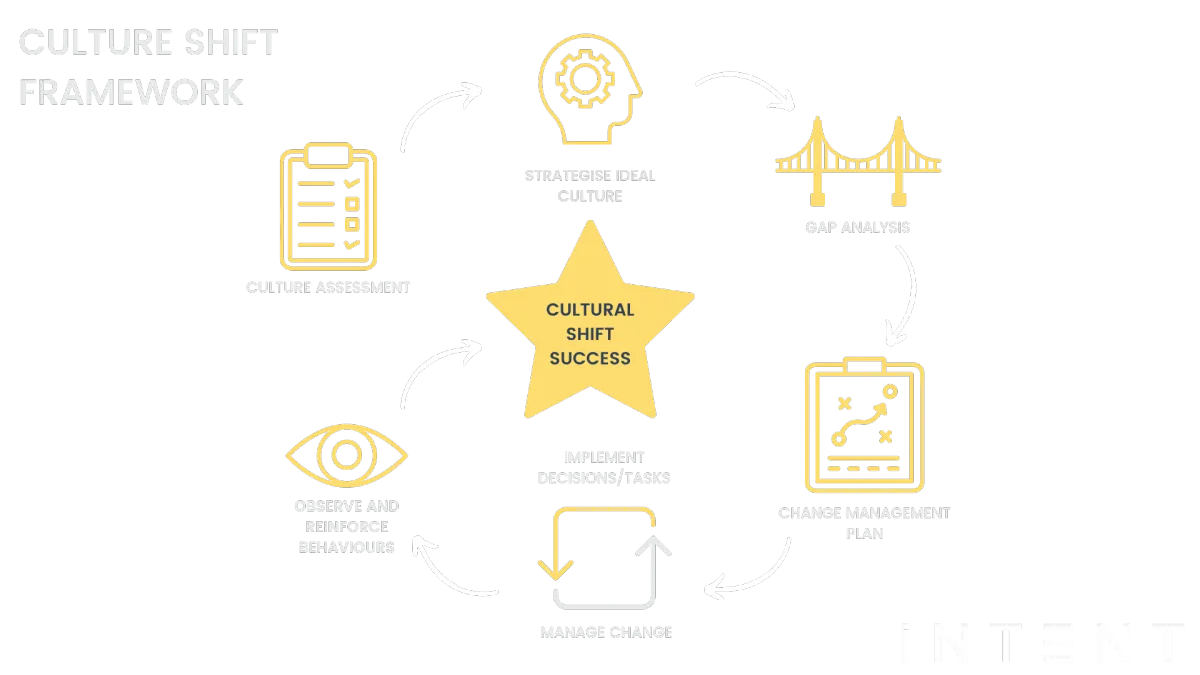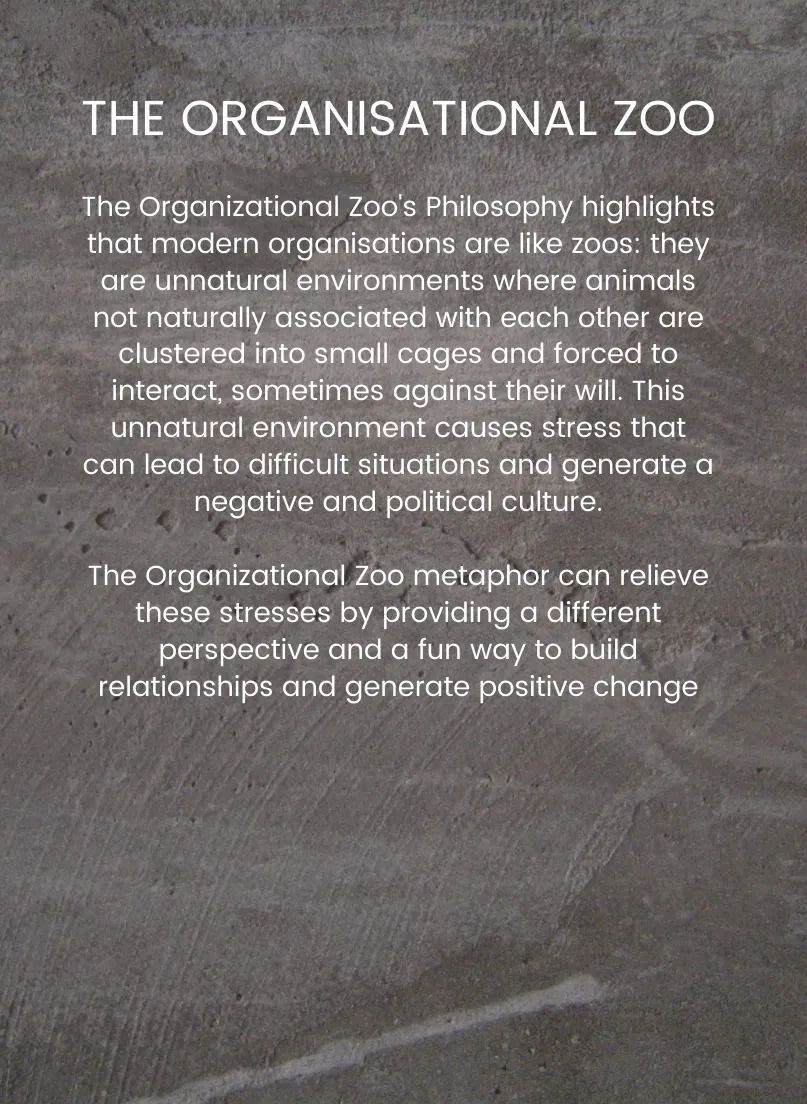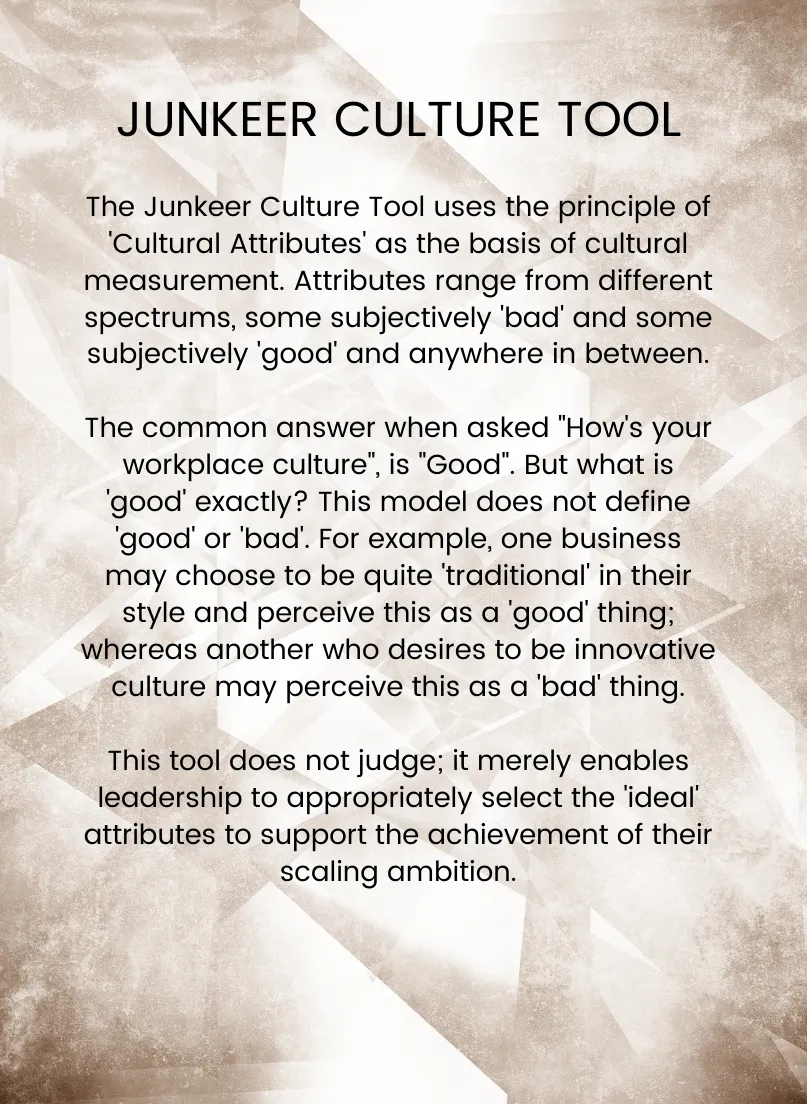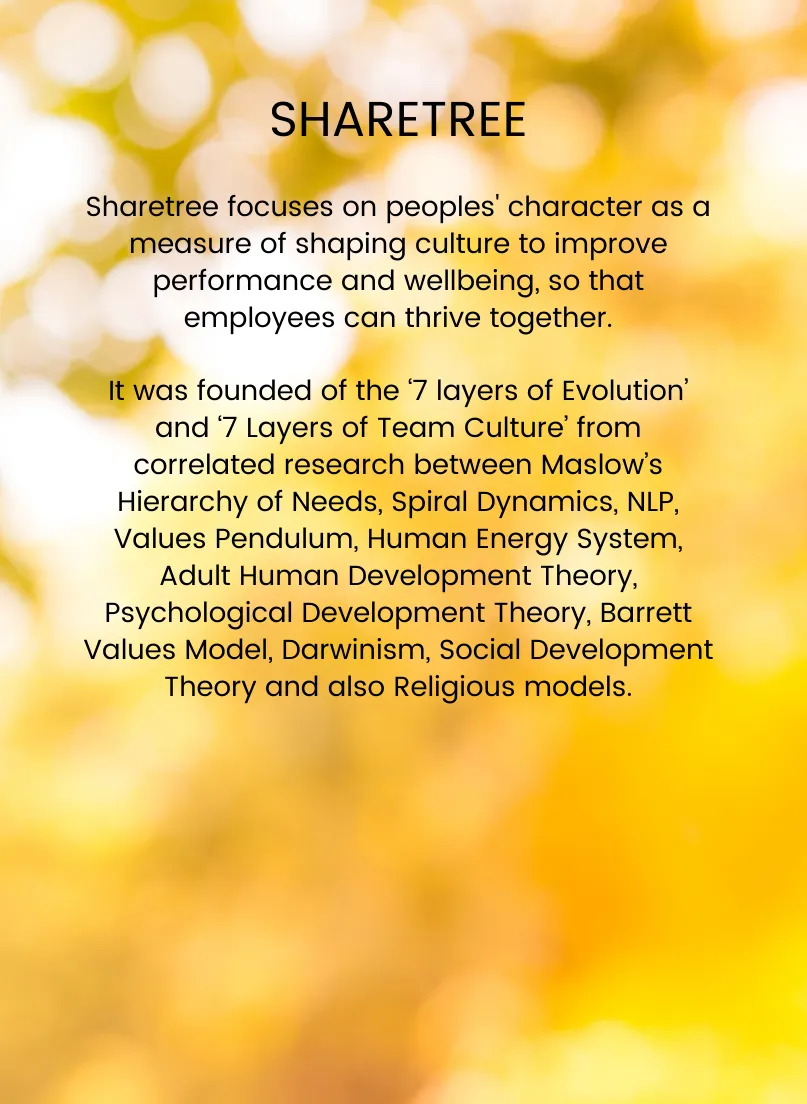ORGANISATION
CULTURE
Culture is the immune system of an organisation - it can be built up or torn down, an organisation is heavily dependent/influenced by it, it can adapt and it will naturally fight the unknown.
It is imperative to understand the current Culture before even thinking about what is wrong with it or why. More than one tool should accomplish this - they should range from internal reflections to objective high-level organisational analysis.
When there is a perceived issue with Culture, the leadership should take the time and effort to correctly diagnose the problem - not assume the solution straight away. When doing this, consider human needs and how these may not be met, and also think of factors that may not obviously link to Culture but could be adversely affecting it (e.g. operating model).

An ideal Culture should align with the Vision of the organisation. Culture is neither for the business or for the people - it is for both. The people make up the business.
Once this is recognised, the Culture will be driven by leaders and built through employees who believe in the business and are enabled through the Culture to achieve its values (and therefore overall Strategy). Culture improves business performance by default, particularly when it is already aligned with Strategy. It is dangerous to take a flippant approach to Culture.
When planning a shift in Culture, it should always be planned and executed as a regular client project would. Using various tools and exercises to do so are strongly advised to achieve a successful shift..
The facts about Culture

1.5 X | 15%| 3YRS
Companies with healthy cultures are 1.5 times more likely to experience revenue growth of 15 percent or more over three years and 2.5 times more likely to experience significant stock growth over the same period

77%
77 percent of workers consider a company’s culture before applying, and almost half of employees would leave their current job for a lower-paying opportunity at an organization with a better culture


TWO THIRDS
Companies with healthy cultures are 1.5 times more likely to experience revenue growth of 15 percent or more over three years and 2.5 times more likely to experience significant stock growth over the same period

CULTURE TOOLS
It is not practical nor effective to find one tool or method that will suit every business when understanding the current cultural climate. A collection of useful tools should be at hand and used when appropriate. Extraneous variables impact on responses which is why more than one tool/method should be used for data analysis in this step.
It is imperative to understand the current Culture before even thinking about what is wrong with it or why. More than one tool should accomplish this - they should range from internal reflections to objective high-level organisational analysis.




THE TRUTH ABOUT CULTURE TRANSFORMATION:
CULTURE SHIFT IS
LED BY LEADERSHIP
Are you a Corporate Manager / Executive? C-Suite? A part of a Board of Directors / Founders? Entrepreneur? Family Business Owner? Start-Up?
We have the scaling intelligence and experience to know you will find great financial success through scale with Intent. Most importantly however, we are especially seeking to collaborate with people that are inspired not just to make a difference to their organisation, but are willing to be part of our purpose of creating Opportunity For Humans.
We know it only takes one person and the choices they make, that make all the difference for so many people.
Are you a Corporate Manager / Executive? C-Suite? A part of a Board of Directors / Founders? Entrepreneur? Family Business Owner? Start-Up?
We have the scaling intelligence and experience to know you will find great financial success through scale with INTENT. Most importantly however, we are especially seeking to collaborate with people that are inspired not just to make a difference to their organisation, but are willing to be part of our purpose of creating Opportunity For Humans.
We know it only takes one person and the choices they make, that make all the difference for so many people.
Scale is as easy as 1, 2, 3:
Intentional Action Starts Here
Scale is as easy as 1, 2, 3:
Intentional Action Starts Here
01
ASPIRE
02
ASSESS
03
ACTION
01
ASPIRE
Decide that you will scale with intent. Inform your organisation of its gaps, do the assessments, define the ambition, get prepared internally to make the ambition a reality.
02
ASSESS
Choose how involved you want to be in the scaling process. Assess whether your internal capabilities only need minimal support or comprehensive support. A shortage of skills is not a weakness, it is an opportunity to make scale easy.
03
ACTION
Take intentional action; simply start doing what is necessary. Achieving great scale is not luck, it is a series of actions. Communicate with us about the first priority. Use our skills to fill gaps you may have. Use our methodology to create a focused pathway. Then DO.
01
ASPIRE
Decide that you will scale with INTENT.
Inform your organisation of its gaps, do the assessments, define the ambition, get prepared internally to make the ambition a reality.
02
ASSESS
Choose how involved you want to be in the scaling process. Assess whether your internal capabilities only need minimal support or comprehensive support. A shortage of skills is not a weakness, it is an opportunity to make scale easy.
03
ACTION
Take intentional action; simply start doing what is necessary. Achieving great scale is not luck, it is a series of actions. Communicate with us about the first priority. Use our skills to fill gaps you may have. Use our methodology to create a focused pathway. Then DO.
These are the stories of others that have taken action to scale with INTENT
OUR CLIENTS
Marc & Marcia Harding
CEO & CFO
Wholesale Horticultural Group
Ross Pearson
CEO
BARD AI
OUR ROLE MODELS
APPLE
Steve Jobs' leadership drove Apple's strategic vision which ultimately inspired the creation of groundbreaking innovation.
Their customer-centricity approach has customers buying things they didn't even realise they wanted.
Apple's heavy investment in its' technology ecosystem was so well built, it made it difficult for consumers to leave, so keep consuming more and more.
WHO GIVES A CRAP
Purpose led organisations like Who Gives a Crap aren't just noble in their vision of supporting causes well beyond business, they have also leaned in to the principle that purpose scales businesses strategically.
The CEO and founder Simon Griffiths openly shares “The biggest lesson I have learned is that doing good is good business,”.
Who Gives a Crap is an impact-conscious organisation, they know to look for things of influence such as sustainability goals.
Google openly shares that its corporate values are centred around innovation.
However, their leadership is sophisticated enough to realise that for them to achieve their goals, they have to also attain innovation concepts from external sources.
They have developed processes to search and outsource ideas.
To harness internal talent they have created a culture of curiosity and celebration of failure.
One of their processes is to make sure to they capture the data of their lessions learnt so this information can be used when taking on new projects.
AMAZON
The leaders at Amazon don't credit its success to the genius of one single leader, but rather a series of structured principles and practices, which are executed diligently and rigorously.
Amazon created a set of scalable and repeatable processes in addition to 14 leadership principles, that helped them get where they are today.
Their obsession with being customer-centric is one of their principles.
Their leadership look at developing long-term strategies which they don't compromise for short-term results.
Management looks for strong talent and ensure they are developed within the company.
The Junkeer Scaling Model works, it incorporates everything the giants before you have done and delivers it to you in a practical step-by this-step approach.
Joining our Scaling Program
Want to take a small leap forward? Our milestone-based program provides a clear guide for start-up founders, ensuring they take the most direct path to achieving their scaling ambition. By eliminating trial and error, guesswork, and uncertainty, we help build start-ups ready for the global stage.
Choose between our month-by-month or all-at-once program options. Regardless of your choice, the program content remains the same. You determine the pace at which you work on your start-up.
These are the stories of others that have taken action to scale with Intent
OUR CLIENTS
Marc & Marcia Harding
CEO & CFO
Wholesale Horticultural Group
Ross Pearson
CEO
BARD AI
OUR ROLE MODELS
APPLE
Steve Jobs' leadership drove Apple's strategic vision which ultimately inspired the creation of ground breaking innovation.
Their customer centricity approach has customers buying things they didn't even realise they wanted.
Apple's heavy investment in its' technology ecosystem was so well built, it made it difficult for consumers to leave, so kept consuming more and more.
WHO GIVES A CRAP
Purpose led organisations like Who Gives a Crap aren't just noble in their vision of supporting causes well beyond business, they have also leaned in to the principle that purpose scales businesses strategically.
The CEO and founder Simon Griffiths openly shares “The biggest lesson I have learned is that doing good is good business,”.
Who Gives a Crap is an impact conscious organisation, they know to look for things of influence such as sustainability goals.
Google openly shares that its corporate values are centred around innovation.
However, their leadership is sophisticated enough to realise that for them to achieve their goals, they have to also attain innovation concept from external sources.
They have developed processes to search and outsource ideas.
To harness internal talent they have created a culture of curiosity and celebration of failure.
One of their processes is to make sure to they capture the data of their lessions learnt so this information can be used when taking on new projects.
AMAZON
The leaders at Amazon don't credit its success to the genius of one single leader, rather a series of structured principles and practices, which are executed diligantly and rigorously.
Amazon created a set of scaleable and repeatable processes in addition to 14 leadership principles, that helped them get where they are today.
Their obsession of being customer centric is one of their principles.
Their leadership look at developing long term stategies which they don't compromise for short term results.
Management look for strong talent and ensure they are developed within the company.
The Junkeer Scaling Model works, it incorporates everything the giants before you have done and delivers it to you in a practical step-by this-step approach.
Joining our Scaling Program
Want to take a small leap forward? Our milestone-based program provides a clear guide for start-up founders, ensuring they take the most direct path to achieving their scaling ambition. By eliminating trial and error, guesswork, and uncertainty, we help build start-ups ready for the global stage.
Choose between our month-by-month or all-at-once program options. Regardless of your choice, the program content remains the same. You determine the pace at which you work on your start-up.

Book in a complimentary workshop to define your scaling ambition and decipher a specific scaling challenge with us.
Contact Us
scale@intent.do
(03) 9544 4494 | 0421 089 979
Suite 31, Level 10/440 Collins St, Melbourne VIC 3000, Australia
OUR SALES PRESENTATION
© Copyright 2025. Intent Scale Pty Ltd. All rights reserved.





